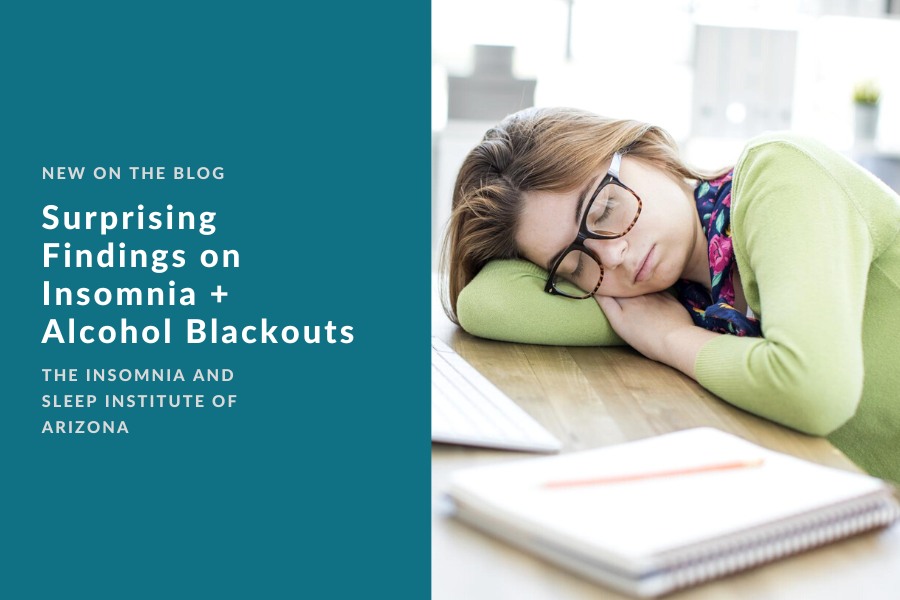Why do some people black-out when they drink a lot of alcohol and others don’t? Surprisingly, one study from Rutgers researchers found that whether or not you have insomnia may be one factor. Insomnia is one of the most common complaints heard at The Insomnia and Sleep Institute of Arizona, and both cognitive behavior therapy for insomnia (CBT-I) and, sometimes, medications or supplements may be helpful. In a surprising analysis, researchers found that “heavy drinkers” who also present with insomnia are less likely to blackout.
When the researchers embarked on this study, they expected to find the opposite. In years past, research has suggested that insomnia actually makes the consequences of alcohol-related events worse. The lead author explains “Because insomnia has been shown to impair memory and cognitive functioning, we thought that participants in our study with severe insomnia and high rates of alcohol use would also have the highest rates of blackout frequency … what we found was exactly the opposite.”
How the Study was Done
Blackouts are actually called “alcohol-induced anterograde amnesia” and the study included 461 college students from an introduction to psychology course at the University of Missouri. The participants had to be at least 18 and self-report that they had partaken in “heavy drinking” sometime in the past month. The researchers defined heavy drinking as 5+ drinks on one occasion or 14+ drinks per week for men or 4 – 7 drinks for women. The cohort was asked about their alcohol habits, blackout experiences, and insomnia. In total, 146 (about one third) were considered eligible as potential insomnia patients (though not all were clinically diagnosed).
The researchers found that alcohol use was higher in those who had less severe insomnia while blackouts decreased for those who reported higher insomnia symptoms. Of course, the authors also say that more work is needed to fully understand the results that are “contrary to much of the established literature.” This hasn’t happened yet, but there is already a plan in place to test new theories—one of which focuses on circadian misalignment. This is a common condition for those with insomnia and also changes how alcohol is eliminated via metabolism. A lot of the enzymes for metabolizing alcohol showcase “time of day dependent variations in activity.” So, if the circadian misalignment manipulates these enzyme activity, then it might also change how quickly alcohol gets eliminated from the system. The researchers stress “We’re not saying that the consequences of heavy drinking are absent for those with severe insomnia … this is not a license to drink heavily if you have trouble falling asleep.”
Insomnia and Other Factors
Understandably, insomnia has a number of co-morbidities, triggers, and associated factors. In fact, one of the staple recommendations for better sleep hygiene for those with insomnia is to avoid alcohol, nicotine, and caffeine (especially before bed). If you think you have insomnia, the first step is getting a proper diagnosis, which can then direct testing and treatment. Insomnia is a common condition, but one that can have serious lifelong effects on your physical and mental health. Alcohol might be just one component in assessing your insomnia and informing next steps.
Researchers do think that the effect of alcohol is stronger for those who don’t have insomnia or who have mild insomnia. “But of course, people who are high in insomnia who drink a lot still experience elevated blackout frequency compared to those who drink less,” say the authors. Typically, blackout frequency is not a reason a patient comes to a sleep clinic, but it might play a role in analyzing a person’s history of insomnia.
Getting Help for Insomnia
CBT-I and medications are the gold standards for treating insomnia. Getting to the root cause of the insomnia is critical, as it can have many (and overlapping) foundations including both biological and emotional. For example, stress can be a trigger for insomnia. There’s also acute vs. chronic insomnia. Acute insomnia, such as from jet lag, is usually nothing to worry about—but chronic insomnia is. If you have trouble staying and falling asleep, you may be suffering with insomnia. Get the help you need today by scheduling a consultation with The Insomnia and Sleep Institute of Arizona. Call the office during business hours or complete the online contact form now.





